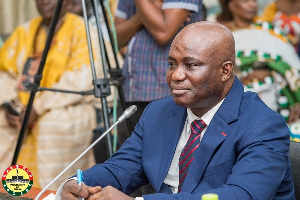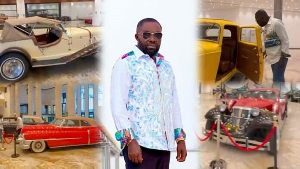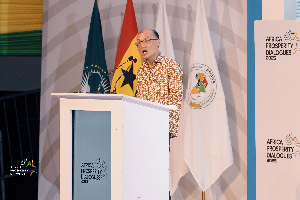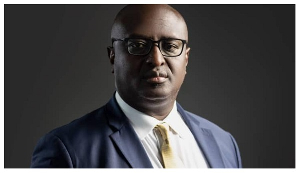In December 2004 Ghana goes to the polls to elect a new president and members of parliament. On a continent where elections are well decided before a vote is cast, Ghana, once the shinning star and leading advocate for total freedom of sub-Saharan African countries, would be setting another pace for the rest of the countries in the sub continent to follow by deciding who governs the country at the polls.
The overthrown of the Nkrumah?s CPP government, a coup plotted and finance by those who felt Dr Nkrumah?s political ideology at the time was too advance for Black Africans and thus dangerous, set the precedent for later interventions by elements who use the barrel of the gun to remove legitimate governments under the guise of revolution, to loot countries, aided by ?businessmen with questionable charaters parading as foreign investors?, thus pushing the sub continent back decades in terms of development. Most of these upheavals tragically happened in the 1970s and early 1980s. Due to easy access to credit at the time as results of Petrol Dollars floating around, most of the inflows into Africa were either looted or wasted on grand projects that did not benefited Africans. In Ghana, Dr Busia?s government was cut short by Achampong?s coup. The 1980s, which became known in the literature as the ?Lost Decade for Africa and Latin America?, began a pay back the loan period for the massive debt that countries accumulated in the 1970s. With its economy virtually at a standstill, Ghana suffered most due to the large expulsions of its citizens from neighbouring countries that were also going through hardships. Jerry Rawlings timely intervention has been questioned by academics, but it could be argue that without the strong leadership that the Rawlings regime provided at the time to push through some of the harsh Structural policies, Ghana would have experience the sort of civil war that engulfed most of her neighbours. Ghana also became the only African country to lose most of its skilled labour. Sadly despite the large inflows into the country today, the brain drain from Ghana is intensifying. The very people that Ghana needs if it is to achieve it?s cherish Vision 2020 project are abandoning the Homeland for greener pastures abroad. Research has shown that every 10 medical and engineering students that graduate from Ghanaian universities, about 6 leave the country. A sad reflection of the precarious state that the country now finds itself.
The 1990s came to be dominated by ex-president Rawlings and his PNDC government and the ?Structural Adjustment Policies? of the Bretton Woods Institutions. By linking sub-Saharan African countries once again into the World economy opened the way for further exploitation by the developed countries? Multinational Corporations under the structural policies. Africa?s share of the world trade has further decline from just over 2% to less than 2%. Over 70% of this trade is mainly between developed South Africa and the industrialised countries. The rest of the 30% of this trade, that is if one can call it trade at all, is mainly in extractive minerals. So the plundering is still going on unabated. In March 2004, Nana Amotia Ofori Payin II question this sort of practice and clearly stated that opening up the country for MNCs to explore for more minerals is not development. I totally agree with Nana Ofori Payin and I believe most of my fellow Social Scientists and Economists do as well.
The essence of development is to help Small and Medium Enterprises to spearhead the nation?s development. Research has shown that SMEs and not MNCs create more employment. Unemployment and underemployment in Ghana and the West Africa sub region is quiet worrying. On my recent visit to Lagos, Nigeria, I had the privileged of interviewing a group of medical students from Ghana, Nigeria and Sierra Leone who have just graduated from University of Nigeria, Nsuka and were about to leave to United States to further their studies. Because of lack of resources at our universities these bright young medical graduates have to migrate to the developed countries of the West to continue with their studies. All agreed that returning to their Homelands to work would be determine by the resources put in place to further their research. In essence since most African countries does not have the money to fund research, these graduates would be lost to the industrialised countries.
Dr Nkrumah?s idea of Unity for the whole continent is what the current European Union are pursuing with vigour and in time will bring in Turkey, a predominantly a Moslem country into the Union. The underline notion behind this unity is to help develop the rest of the Eastern countries of Europe. The very people who opposed Nkrumah?s policies are implementing it for their benefits namely the enlarge European Union and NAFTA (North American Free Trade Area) to facilitate and encourage Trade and Development in their respective Regions.
What an irony.
The very idea of the EU uniting the European continent to the pre World War two periods vindicates Dr Nkrumah. Dr Nkrumah?s novelty idea of uniting Africa was well ahead of its time.
Virtually every country in sub- Saharan Africa bar South Africa has been hit by crisis. Ghana?s economic and political instability after the overthrown of Dr Nkrumah mirrors the rest of the sub continent. And in West Africa, Ghana only escape civil war due to Dr Nkrumah?s policy of unity put in place soon after independence, however its economic history has been a total mess. It is true that some of the policies that Dr Nkrumah pursued under Import Substitution Strategy were wrong, yet what cannot be denied is that under his leadership Ghana made some modest gains in terms of human development. Dr Nkrumah?s policy of integration and advancement benefited Ghana immensely and to some degree some of the countries that were still under colonial rule. Realising that education and unity is what can propel a nation to self sustainability, Dr Nkrumah introduce free education to the northern half of the country where poverty was still rampant and the citizens did not value the benefits of education. Ghana?s premier Universities, University of Ghana, Legon, and Kwame Nkrumah University of Science and Technology Kumasi, attracted a host of students and scholars from Africa and beyond. Korle Bu Teaching Hospital of the University of Ghana, Legon, and Okomfo Anokye Teaching Hospital of University of Science and Technology, Kumasi, was the leading teaching hospitals in West Africa. Ironically, Dr Francis Nkrumah, one of the well-known African surgeons in his field of study and a son of the late president was trained at Korle Bu Teaching Hospital of University of Ghana.
Ghana?s political scene has been dominated by two personalities since independence, namely Dr Kwame Nkrumah and Flt Lt Jerry John Rawlings, discounting the military interlude and Dr Busia?s brief rule in the early 1970s. Under Dr Nkrumah?s leadership Ghana gained its political freedom and was regarded as the one African country with a potential to achieve middle-income status in no time. Then during the crisis of the 1980s Ghana became the first sub Saharan African Country to embrace the World Bank/ IMF Structural Adjustment Policies under John Jerry Rawlings. During the period in question, Ghana was the only African country to lose most of its skilled labour. Like Dr Nkrumah, ex- president Rawlings dominated the Ghanaian Political environment for over 20 years. Under President Rawlings leadership, Ghana was hailed as a success story and an ?African Miracle? after he successfully implemented the World Bank/IMF structural policies that enable the Bretton Woods Institutions to lock in the continent?s economies into the Globalise market. What cannot be denied was that however unpopular the structural policies were, Rawlings was able to link into the Ghanaian economy those skilled labour that Ghana lost in the 1970s and 1980s and continue to loose. Rawlings policies under structural programmes (with the total liberalisation of the economy) enable skill Ghanaians to gain confidence in the Ghanaian economy and start remitting to the homeland. This remittance is now the third largest earner after Cocoa and Gold. The uses of the remittances by the expatriate and returning Ghanaians have baffled commentators and academics alike. Unlike the normal uses of remittances, the remittances from Ghanaians in Diaspora are going into business and real estate. The remittances reached a total of $1.5 billion US dollars in 2003.
Soon after taking over from President Rawlings in yet again another peaceful and free elections, President Kufuor, recognising the impact of inflows from his compatriots in Diaspora, together with a very dynamic youthful and well educated ministers, technocrats and traditional rulers, organised a ?Home Coming? summit to tape into the expertise of their compatriots in Diaspora who have excelled in their chosen fields. The encounter was a watershed. At the summit the president presented to the audience his programme to uplift the country, once a shinning star in Africa, out of poverty by laying out his poverty reduction strategies. The president?s honesty in outlining the country?s desperation to attract talent and funds and to stop the ?Brain Drain? was telling. This has lead most commentators to favourably compare the president to Dr Nkrumah.
Policies:
Whilst Dr Nkrumah and his contenporairies at the time of Independence saw the strategy of Import Substitution as a way forward, the world has moved on from that era and with development now determined by geo-politics and globalisation led by The Multinational Corporations of the Developed Countries (incorporating International Division of Labour), the policies being pursued by the current administration is sound. This is complemented by the role being played by the traditional rulers, such as HIV/AIDS prevention strategies and Universal Education policies using private funding such as Otomfuo and Osagefuo Education Funds and various schemes.Since the 1960s Ghana has not develop any major infrastructure. For a country to advance, both human and physical capital should be developed first and hence would be the cornerstone for a successful take off. South Korea and Malaysia, countries that Ghana always compares herself with both undertook drastic land reforms, making sure that their countries were self sufficient in food production before attention were turned to Small and Medium Enterprises. In the case of Korea (despite the Dependency School?s protestation that the development of Korea was ?Guided? by United States of America) the government actively engaged in and set the rules for SMEs to grow under heavy protection. Both the Korea and Malaysian governments used the large inflows to developed their human capital and Small and Medium industries before the take off.
The argument sometimes used by some academics and commentators that the Asian NICs (Newly Industrialised Countries) shared a common heritage and have a different work ethics than most countries in sub-Saharan Africa is pure nonsense. In Ghana, soon after independence, Dr Nkrumah built a strong unity by actively encouraging inter-tribal marriages and bringing tribes together to for a common bond. Thus the inter ethnic and tribal strife that has engulfed most of the countries in Africa and led to massive killings and destruction has largely escape Ghana.
The very fact that all stakeholders have embraced the Vision 2020 phenomenon would hearten Dr Nkrumah?s spirit. For at the heart of Dr Nkrumah?s ideas was to see Ghana achieve middle-income status. These same ideas were behind Dr Kofi Busia?s Progress Party?s policies of which the current President served. The fact that both parties (PP/NPP and CPP/NDC) both share the same goal but different approaches is marked. Ghana stands at the threshold of greatness. However what policy makers and commentators have failed to grasp is that Ghana cannot move forward without the rest of the West African sub-Region. The inflow of refugees from Liberia/Sierra Leone/ Ivory Coast cannot be ignored. It is an issue of our shared heritage.
To free scarce resources for the programmes that would aid development, the Kufuor government signed up to the Highly Indebted Poor Countries programme of the World Bank/International Monetary Fund. Like Nkrumah, Busia and Rawlings before him, Kufuor had no other options but to sign up to the HIPC. What President Kufuor cannot and should not ignore is to pursue infrastructure development without investment in Basic Education and Primary Health care.
Despite his autocratic regime during the last years of his rule, Dr Kwame Nkrumah indeed laid down a solid foundation for the country. The sense of unity and patriotism that Kwame Nkrumah instilled in Ghanaians can never be questioned. And years after Dr Nkrumah?s death, his legacy lives on. Although I was still a toddler when Dr Nkrumah was overthrown, but the legacy that he left behind for our generation is still strong. President Kufuor is showing similar traits and let?s hopes he follow in Dr Nkrumah?s footsteps.
Peter Jeffrey MSc, BSc(Hons)
London
Email: peter_jeffrey0@yahoo.co.uk


















